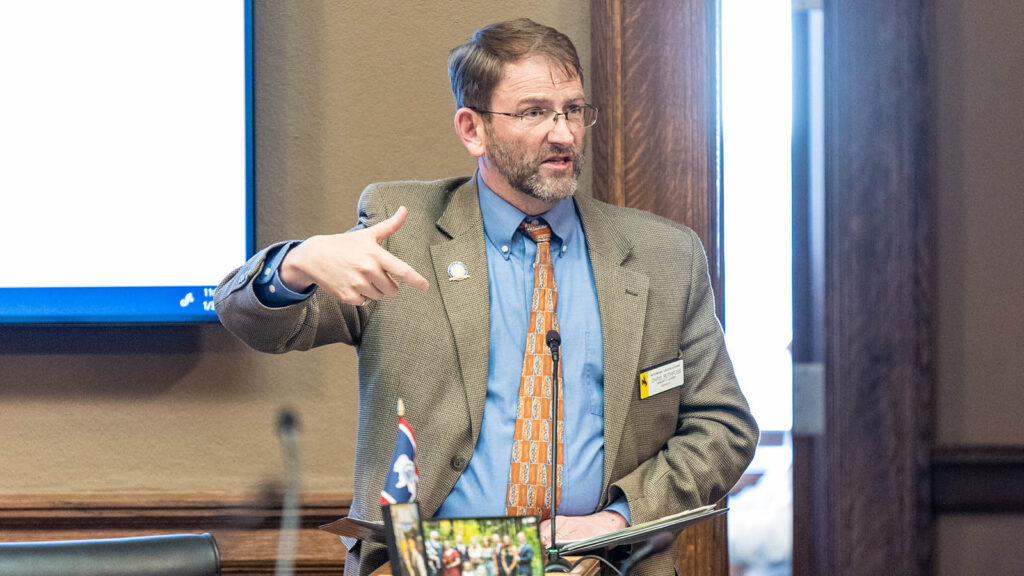Frictionless payments, which could eliminate costly credit card fees charged to merchants for consumer purchases, just became a little more likely with Gov. Mark Gordon’s decision on Friday not to veto Wyoming’s stable token.
Gordon vetoed the first version of Wyoming’s stable token last year, but said lawmakers had made “enough progress” on his concerns that he would allow it to become law this time, albeit without his signature.
Gordon said it’s clear that digital currency will be part of the financial sector’s fabric in the future, and that Wyoming’s approach is “laudable.”
“Although,” he added, “I must acknowledge the irony of implementing a government-issued stable coin to further an expressed goal of fostering monetary transactions free from governmental regulation.”
Wyoming’s law, however, needs much more work to become reality, Gordon suggested, and the legislation is missing key details, such as a true business plan. Such a plan would outline the program’s exact costs, spell out the requirements of a director, determine the exact size of the required trust, as well as other such vital elements.
Costs could well exceed the legislature’s $500,000 appropriation, Gordon added, and the work of crafting the business plan might “illuminate gaps” that will have to be addressed in future legislative sessions.
These factors suggest the bill’s timeline of December 2023 — which was not made a requirement in the legislation — for the first token is in doubt. Gordon did promise to work through all of the issues diligently, though, so the state can issue a Wyoming stable token “without undue delay,” but with all the “proper safeguards for Wyoming’s reputation and treasure.”
Credit Card Substitute
Frictionless payments that eliminate costly credit card fees have been a key talking point around Wyoming’s stable token, as lawmakers were developing Senate File 127 this legislative session.
Testifying to that was American CryptoFed DAO, a Decentralized Autonomous Organization, which wants to use Wyoming’s stable token for such exchanges.
A DAO is essentially a digital group that comes together for a common purpose.
American CryptoFed DAO already has the endorsement of the Merchant Advisory Group, which represents many of the nation’s largest merchants. Between them, they have more than $4.8 trillion in annual sales at more than 580,000 locations nationwide.
The payday for Wyoming, if the DAO is successful in realizing its goal is enormous. If just 5 percent of the merchant’s transactions were to go through Wyoming’s stable tokens, the return for the state, based on one-month T-bills generating 3.86% interest, is around $9.3 billion, according to estimates from American CryptoFed DAO.
Chief Financial Officer Xiaomeng Zhou told Cowboy State Daily that American CryptoFed DAO is already working on the details of its pilot with MAG merchants in Wyoming, and plans to use the Wyoming Stable Token for those daily retail transactions.
“Together they will be able to generate billions of U.S. dollar revenue per year for the state of Wyoming,” Zhou told Cowboy State daily in an email.
Biggest Adversaries
Federal regulators have already clobbered some of Wyoming’s digital asset companies, however, rejecting, for example, Custodia Bank’s application for access to the Federal Reserve system.
The Fed claimed that the Wyoming bank’s safeguards against money-laundering and support of terrorism weren’t strong enough, even though a Special Purpose Depository Institution, as a Wyoming state-chartered bank, already has to observe all the existing federal know-your-customer rules that are aimed at preventing that.
Wyoming wrote its digital bank laws in collaboration with the Kansas City Federal Reserve. In fact, Gordon was once a member of a Kansas City Federal Reserve Board.
American CrytpoFed DAO, too, is presently facing difficulties — an enforcement action by the Securities and Exchange Commission, after the DAO sought to register its two tokens with the federal agency.
Chief Financial Officer Xiaomeng Zhou has told Cowboy State Daily that American CryptoFed DAO’s repeated requests for guidance on registering its two tokens, the Ducat and the Locke, have fallen on deaf ears. Three letters have been sent requesting the name and contact information of the DAO’s enforcement agent, according to court records, with no response.
Zhou has expressed optimism that the DAO’s enforcement case will highlight how uncooperative federal regulators have been with digital asset companies in general, and said he was heartened when the judge on the case not only accepted all of the DAO’s evidence, but said she gets the DAO’s point about how difficult the SEC is making it for companies to understand and play by the rules.
Regardless of how the case turns out, it highlights that there are potentially dark clouds hanging over Wyoming’s aspirations to lead in the digital asset sphere, based on recent regulatory actions from federal agencies.

WYO Token Not A Security
Sen. Chris Rothfuss, D-Laramie, a key architect of the Wyoming stable token, said he is not worried, despite the current regulatory climate, that the SEC can block Wyoming’s stable token.
“We have structured it in such a way that it utterly fails to be a security,” Rothfuss said. “I can’t imagine how they could possibly classify it as such. There’s no way you can make money on a Wyoming stable token.”
Each stable token is a digital representation of a single U.S. dollar, held in trust for the token holder.
To back the token, Wyoming will buy short-term U.S. treasuries, which will generate some interest earnings for the state. Those earnings will be allowed to accumulate until they total 102 percent of the value of all tokens, so there will always be more than enough cash on reserve to redeem them.
But, while Wyoming will collect interest on the treasuries backing its stable token to fund the program, individuals buying tokens won’t get anything more than what they’ve put in.
One token in, is one dollar out for individuals.
“There’s no way you can make money on a Wyoming stable token,” Rothfuss said. “There is no possibility of a Wyoming stable token appreciating. And there is nothing that it represents, beyond the right to that $1 that is held in trust on behalf of the token holder.”
Winning Over Skeptics
Others, once skeptical of a Wyoming stable token, meanwhile, say they are starting to come around to the idea. Among these is former state representative Tyler Lindholm.
“I was leery of it based on the simple predication that there’s private businesses doing this, and what role is it of the state to compete with private businesses in this regard?” he told Cowboy State Daily.
But over the year, Lindholm has seen entities claiming to have 100 percent assets on reserve that do not really. He has begun to warm to the idea that a Wyoming stable token might well be the answer the digital asset sector needs to progress and innovate.
“The state of Wyoming’s books are completely auditable,” Lindholm said. “So, anybody can look and see if those reserves are there. That’s kind of built-in functionality, and the state of Wyoming already has a considerable stake in this as far as being able to hold assets.”
Crypto Horse Already Out Of Barn
Lindholm and Rothfuss are both skeptical, however, that recent actions, which appear to be aimed at ejecting crypo from the American banking system will work. Digital coins are already part of the financial realm, and have been for almost a decade now.
“With the advent and ease of using VPNs, it’s not hard to trade digital assets overseas,” Lindholm said. “I would never do that myself, of course, but, you know, that’s what I hear others have done. So, if the U.S. thinks they’re going to block people from trading digital assets, they’re crazy, or high, one or the other.”
Rothfuss said current arguments about consumer protection when it comes to cryptocurrency in banking don’t hold water. If it were really about consumer protection, Rothfuss suggested, Custodia Bank, whose business model as a Special Purpose Depository Institution requires holding 100 percent of the value of digital assets on reserve, would not still be fighting for access to the Federal Reserve three years later.
Custodia bank can’t “melt down” like Silicone Valley Bank did, Rothfuss said, because their business model doesn’t allow them to lend anything. There’s no fractional reserve banking for Wyoming’s Special Purpose Depository Institutions.
“Those resources are not at risk,” Rothfuss said. “That’s the whole reason we created them as we did.”
What’s really going on right now, Rothfuss believes, is that national banks are lobbying regulators to throw up obstacles, so that Wall Street insiders can play catchup in the digital sphere. The recent approval, late last year of BNY Mellon’s plans to offer a product similar to what Custodia planned to offer — without promising to hold 100 percent on reserves — is a recent case in point.
“When (national banks) have all of their own tools in place, this will no longer be a problem,” Rothfuss predicted. “It’ll be funny how suddenly one day all of this concern goes away.”





